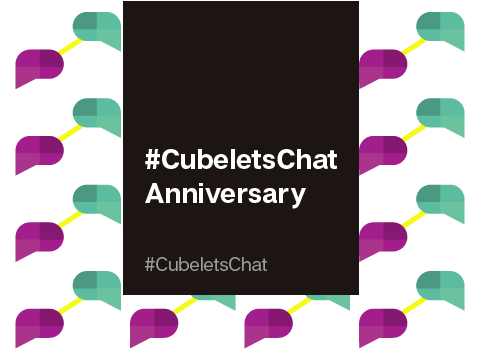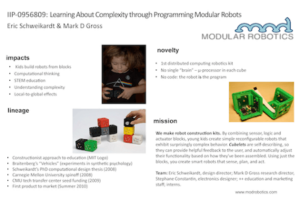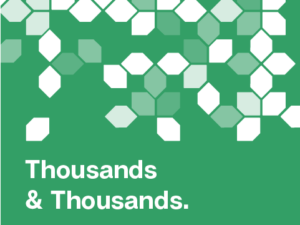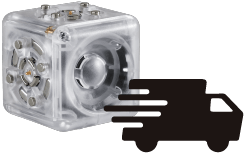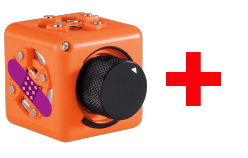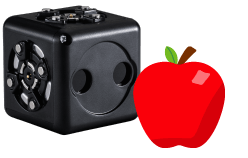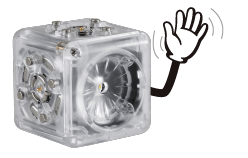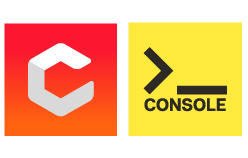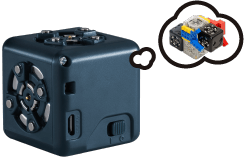(Warning due to a website update many links in this post are temporarily down – We’re working to bring them back ASAP!)
It’s been over a year since we launched #CubeletsChat, our blog and email series for teachers by teachers. Every topic we write about comes from a question or conversation with an educator like you. Whether we’re highlighting some great resources for your sub binder or helping you dive deeper into the computational thinking skills that Cubelets can teach, #CubeletsChat is specifically for you.
Whether you’re new to the Cubelets community or are adept at looking for the next steps with Cubelets, hopefully, you’ll find a couple of articles that meet your needs along your Cubelets journey.
For Cubelets Beginners.
For the Beginners: It’s easy to be intimidated by Cubelets when you first pull them out of the box. After all, they’re blocks…that teach computational thinking…but how?
Introducing Programming with Block-Based Coding
Tactile Coding is Computer Science for All Ages
These posts answer the most fundamental question behind Cubelets — why?! With growing interest in computer science literacy for all students, Cubelets introduce the thinking skills that are fundamental to computer science and problem-solving. Plus, they don’t require any screen-time for students. This makes them a more accessible tool for diverse learners, and allows you to focus on the thinking.
First Week of School Activities with Cubelets
Getting the most out of Cubelets Activity Cards
Besides the Cubelets Lesson Plans, we also publish Cubelets Activity Cards for you to use in a Workshop Model classroom. The First Week of School Activities can also be a great way to reset your classroom culture after a break, while simultaneously helping your students get familiar with Cubelets as a learning tool.
Structures of a Cubelets Classroom
Cubelets Classroom Management Guide
Being a teacher means managing the nuts and bolts of the classroom behind the scenes. Cubelets are in a league all their own with regard to classroom management and student engagement. Here, we make sure you know what to expect and help you plan ahead to be even more successful on your first day using Cubelets with your students.
For Cubelets Adepts.
For the Adepts: As an Adept, you are already comfortable with what each Cubelet contributes to a system, and you have tried-and-true routines for introducing Cubelets to your students. Here are some of our posts to help launch your students to the next level:
Teach Coding with the Create with Cubelets Video Series
Cubelets teach coding and computational thinking right out of the box, but once your students understand what each Cubelet can do — and how they work together to form larger robotic systems — it’s time to introduce Cubelets Blockly and the Cubelets App.
Interventions and Extensions with Cubelets
It’s normal to introduce a new tool using a whole-group approach with your class. But once you, as the teacher, are comfortable with Cubelets in your classroom, it’s time to start including pedagogical best practices. Appropriate interventions and extensions for your students are a great first step, and every Cubelets Lesson Plan has suggestions to get you started!
Computational Thinking with Cubelets
So, what is Computational Thinking anyway? Now that you and your students have settled into the robot routine, it’s time to get meta. Teaching students how to think about their thinking is one of the best ways to help them become lifelong learners. Can students dissect their process while they design a Cubelets robot? Can they identify which Computational Thinking skills they excel at and which skills need more practice?
Scaffolded Questioning: A Differentiation Technique
Sure, Cubelets were designed to be intuitive for kids, but to use them in a classroom environment requires an invested educator. You matter — and one way you can prove it is to play around with some scaffolded questioning techniques. Scaffolded questions allow you to differentiate for your students without them ever realizing they’re getting different questions from their peers. Try using your questions to assess and respond to each student’s Zone of Proximal Development.
For Cubelets Masters.
For the Masters: Cubelets Masters are the resident experts. You already know how each Cubelet works within the system and are inventing your own Cubelets curriculum to meet your classroom needs. Your students already know how to build steering robots and animal-adaptation robots, so it’s probably time to start programming with Cubelets. You are excited to dive deep into this new Cubelets challenge. These posts are to push your thinking and show you how Cubelets can change the way you approach computer science with your students.
Assessing Computational Thinking
You already know what computational thinking is, and you know when it’s present in your classroom, but how do you measure student growth in computational thinking? How do we know whether a student is “at grade level” as a computational thinker? We explore this question and share some new research around the topic in this blog post.
Remote Control: The Secret Data Collection Tool
As students are ready to dive deeper into the concept of Cubelets as a network of computers, it is important that they have a way to collect and interpret data about their robots, so they can confirm or deny their hypotheses. This post introduces how to use the Remote Control function within the Cubelets App to collect information about robots and gives you some ideas about what to look for in your students’ investigations. If you’d like to test your understanding of Cubelets as a computer network, check out Cubelets 102, our free online workshop. It’ll take you less than an hour to complete and give you feedback along the way.
Data Flow Diagrams: Visible Thinking with Cubelets Diagrams
When your students begin to investigate how Cubelets work together as a network, Data Flow Diagrams are the way to gain insight into what students are thinking. This is essential to catching student misconceptions and addressing them early. It’ll also push your thinking and by the time you move into programming with Cubelets Blockly, you’ll be ready for a whole new approach to programming.
Most importantly, we need to keep this dialogue going. What questions do you still have about Cubelets? What questions can we answer for your administrator or colleagues who are hesitant to get started? Have you discovered any of the mysterious or inexplicable robots along the way? Let us know by commenting below or emailing support@modrobotics.com with the subject #CubeletsChat ideas.
